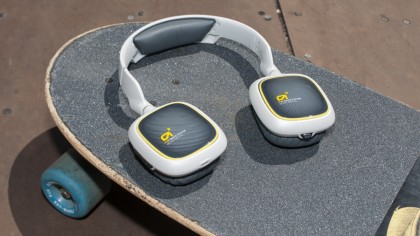Why you can trust TechRadar
There's almost nothing bad to say about the A38 in this category. The A38 packs a powerful sound in a small package, and active noise cancellation nearly eliminates all outside noise with the exception of the headphones' own audible hiss.
Because these are on-ear and not over-ear headphones, though, it's tough for them to completely block out outside noise. If you're looking for complete over-ear isolation, prepare to drop an extra benjamin and upgrade to the A40 or look at another brand altogether.
I didn't find them as bass-heavy as the Beats Studio Wireless, but the A38s are much more faithful to the audio. It's not that they ignore the low-end – far from it, actually – just know that the bass won't be as deep or as prevalent as some deep-note enthusiasts like.
I listened to a few different genres, but fondly remember the time spent with The Strokes' "Is This It" and Outkast's "Stankonia", first on my PlayStation Vita and then on a smartphone and iMac. While both support A2DP and AVRCP Bluetooth, I found that the Mac and smartphone (an iPhone 5S in this instance) held the signal longer without interruption and didn't need to be constantly reconnected.

Idling out, it's worth noting, is the only way the signal drops. (Besides dying, obviously.) Range really isn't an issue. I took the A38s clear from my desk to the kitchen – about 40 feet through drywall – and the A38 didn't drop a beat.
Drop the mic
Mic quality can be tough to critique. Unless you leave yourself a voicemail, there's no great way to find out, objectively, how well it performs.
After making a few phone calls in a blind, pick-which-one-you-think-sounds-better audio test, the lab rats – ahem, friends and family – often preferred the Astro A38. This was especially true if I was conversing in a quiet place, like my apartment or here in the office. Take them out onto the street, though, and the results came back inconclusive.
The built-in mic isn't designed to be noise-cancelling when you're not speaking, which can be annoying in high-traffic areas. This means that the person on the other end of the line will be able to hear cars, pedestrians – hell, even high wind can derail the conversation.
It's passable for a higher-end pair of headphones, but realistically it would've been in Astro's best interest to include some of the noise-reduction technology in the microphone that other headset manufacturers, like Turtle Beach, have built their reputation on.
Verdict
It's expected that great, high-performing technology doesn't come cheap, but for $230, I think the average gamer would expect a bit more. Whether that means adding a 3.5mm jack for easier PC gaming, or a better microphone, is ultimately up to Astro Gaming.
That said, the beta program made notable improvements to the Astro Gaming A38. For instance, the less-popular mini-USB port on the side of the headphones might not have been replaced with its more widely used little brother, microUSB, otherwise. Plus, that Astro outfitted this slender, 188g set with noise-cancellation technology is a feat in itself and should be commended.
It's darn stylish, too. Customize a tag on Astro's website, and you'll be the coolest kid at the next gaming convention. Ultimately, lengthy battery life and a style win the Astro Gaming A38 a recommendation for the mobile gamer that can't swing close to $400 for Beats.
Nick Pino is Managing Editor, TV and AV for TechRadar's sister site, Tom's Guide. Previously, he was the Senior Editor of Home Entertainment at TechRadar, covering TVs, headphones, speakers, video games, VR and streaming devices. He's also written for GamesRadar+, Official Xbox Magazine, PC Gamer and other outlets over the last decade, and he has a degree in computer science he's not using if anyone wants it.

